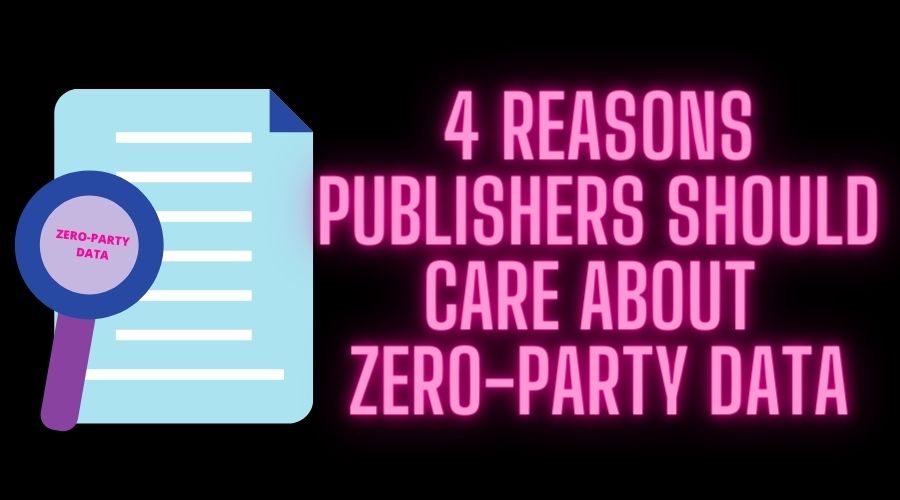
This post was most recently updated on April 24th, 2024
Rising concerns about online privacy, the deprecation of the cookie, and increasing unreliability with third-party data have increased the value of first-party data. Data collected directly from your website visitors is trustworthy and exclusive to you.
However, there’s something even more powerful: zero-party data.
Zero-party data is data that is intentionally shared by customers. It goes beyond first-party data, which is gathered by visitors to your website by observing or tracking visitor behavior.
Zero-party data means the visitors have voluntarily provided the information, such as filling out a registration form, selecting website customization, or providing an email. It’s the most valuable data you can collect because the source is transparent and attributable.
Publishers can leverage zero-party data to personalize content and advertising. For example, with a clear picture of how subscribers to an email newsletter engage with content on your site, targeted advertising becomes even more valuable to advertisers and partners.
With tracking cookies going away, zero-party data can help bridge the gap in third-party data.
While there are plenty of reasons why a publisher should care about zero-party data, here are four specific reasons.
The data comes directly from the visitor, which means it is qualitative and accurate. Because information is given voluntarily, it is also highly relevant.
The term zero-party data was first coined by analysts at Forrester. Fatemeh Khatibloo, Principal Analyst at Forrester said zero-party data is gold. “When a customer trusts a brand enough to provide this really meaningful data, it means that the brand doesn’t have to go off and infer what the customer wants or what (their) intentions are,” said Khatibloo in this video.
With accurate and attributable data, you can improve the effectiveness of your advertising or content delivery. This can significantly reduce marketing waste and improve efficiency.
By collecting data at each touchpoint and tracking user behavior across the stages of the customer journey, you can target content and advertising more accurately. This not only makes advertising more efficient, but it can also help keep prices in check.
We got a glimpse into what can happen when third-party tracking, such as cookies, goes away. When Apple limited Facebook’s ability to ID users browsing websites, we saw a dramatic increase in CPM costs for Facebook ads. Many advertisers saw increases as much as 50%. With zero-party data, you’ve got the high-quality data you need.
One distinct advantage that social media sites have had is that they have access to vast amounts of zero-party data. Since these sites require a sign-in, nearly every data point they gather is attributable. When they click on a post, engage with a topic, share an item, or create content, it all creates a record that can be aggregated for target messaging. E-commerce sites have this advantage as well. When customers make purchases, retailers can suggest compatible products. It’s why so much of Amazon’s revenue comes from its recommendation engine. The more data they have — and the more relevant the recommendation — the more likely Amazon is to make a sale.
By growing your zero-party data, publishers are better positioned to compete with social media and retail platforms. The more data you gather, the less you have to rely on other mediums and aggregators for targeting.
A robust zero-party data strategy can help publishers and advertisers engage in a more personal and meaningful way with visitors. By collecting zero-party data and incorporating it into your CRM, content, marketing, and advertising platforms, you can better target individual consumers across owned channels.
Think about how much more effectively you can target when you know a visitor’s preference, which content they’ve engaged with, and how much time they spend on various topics. This can help you make future content even more relevant and valuable for visitors. With today’s dynamic content engines for websites, you allow you to personalize what visitors see when they come to your site more directly.
For advertisers, this information can indicate buyer intent, allowing for the personalization of product recommendations based on known variables.
Because the source and collection of the data are known — and intentionally shared — it mitigates many of the compliance concerns from GDPR, CCPA, CPRA, and other privacy regulations. As long as companies follow guidelines for requesting, tracking, storing, and using the data gathered, zero-party data will be compliant.
Zero-party data not only meets the letter of the law, but it meets the spirit of the regulations. It allows consumers to decide what, when, and how to share the information. With transparency, consumers know the benefit of sharing information, giving it voluntarily, and you overcome the challenges of privacy vs. personalization that marketers and publishers struggle with.
Trying to personalize and engage with users based on third-party data will become less effective (and available) in the future. You’re also paying for it and relying on others who control the relationship. Retargeting becomes even more challenging.
With both zero-party data and first-party data, you control the data and relationship. This allows you to customize content and advertising in a more targeted way. The more zero-party data you have, the more effective you will be in reaching consumers with relevant information and ad delivery.
With third-party data, you’re renting the relationship and it can change or be withdrawn at any time. Continuing to use it means continuing to rent. With zero-party data, you own the data and the relationship.
With cookies going away, and the platforms owning all the good targeting data, the ability for publishers to collect their own data helps them sell more targeting options to their advertisers, and drive higher CPMs.
Gathering zero-party data takes a proactive approach. If you want to get zero party data, you’ll have to ask for it. Here’s the good news, though. 79% of consumers say they are willing to share data if there is a clear benefit for them. However, it does take a good value proposition to get them to share. Zero-party data is easy to collect with tools like Admiral VRM, an engagement automation layer for media publishers to build personalized relationships with every visitor.
Lots of people talk about the value of data, but not everyone has a good plan for collecting it. With a visitor relationship management platform, publishers can collect zero-party data at every step of the visitor journey. Publishers can be in the driver’s seat with every AdBlock detection, paid subscription, email or social signup, privacy consent, or app download, all managed by a single VRM platform that increases ARPV with each interaction.
Post Credits:
Don Rua
Marketing Director
Email: don@getadmiral.com

With over ten years at the forefront of programmatic advertising, Aleesha Jacob is a renowned Ad-Tech expert, blending innovative strategies with cutting-edge technology. Her insights have reshaped programmatic advertising, leading to groundbreaking campaigns and 10X ROI increases for publishers and global brands. She believes in setting new standards in dynamic ad targeting and optimization.
10X your ad revenue with our award-winning solutions.